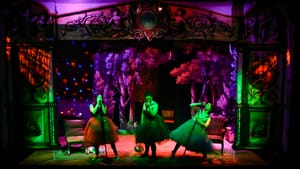Stay in the Loop
BSR publishes on a weekly schedule, with an email newsletter every Wednesday and Thursday morning. There’s no paywall, and subscribing is always free.
Punk-rock Prozorovs
Curio Theatre Company presents ‘Three Sisters, by RashDash, After Chekhov’

How lucky we are to have three distinctly different interpretations of Chekhov’s Three Sisters currently running in Philadelphia. The various viewpoints offer something to fit every taste profile. Those who prefer their classic drama with a punk-rock twist should head to West Philly, where Curio Theatre Company presents the U.S. premiere of Three Sisters, by RashDash, After Chekhov.
The U.K.-based feminist theater collective RashDash doesn’t so much adapt Chekhov as upend him. In this setting, Olga (Colleen Hughes), Masha (Rachel Gluck), and Irina (Tessa Kuhn) have a message for him and for all canonical male playwrights: “Fuck you and your excellent words.”
Always performing
The 70-minute show could end right there and still communicate most of its message, but I’m glad it doesn’t. Director Meg Trelease’s imaginatively designed, terrifically acted production often digs deeper than the material in probing the question of a woman’s place on stage. It hums along with a high-octane sense of humor that still addresses the serious questions of representation in theater — past, present, and future.
The actors convey boredom and energy in equal measure. The boredom comes from hewing closely to expected roles for women, both on stage and in life. Trelease cleverly introduces this concept through a series of false curtain calls, underscored by smatterings of polite applause (sound design by Damien Figueras, who also composed the energetic music heard throughout the evening). Hughes, Gluck, and Kuhn simultaneously play a version of the Prozorov sisters, a version of actors playing them, and a version of women in society — a reminder that the male gaze always expects women to perform.
Paul Kuhn’s false-proscenium set cleverly reinforces the notion of acting in everyday life. Even after they retreat from the stage, the women still feel drawn to their assigned roles. Sometimes this strikes a funny note: heartbroken Masha tries to forget Vershinin by trolling Tinder, and well-meaning Olga wonders when she’ll finally gain the strength to ditch Facebook once and for all. At one point, they all don complementary costumes (by Aetna Gallagher) that span the range of Britney Spears’s early career.
Ruinous feminism?
Yet the play has the most to say when it’s at its most serious. Why does Olga worry about her uncertain future? “I can already feel the time approaching when no one will care what I think anymore,” she mournfully sighs. As the oldest, she stands acutely aware of how culture perceives women as they age. Perhaps it’s discursive, but on the eve of another presidential election that so far has drawn at least five potential women candidates, I couldn’t help thinking about how accomplished women are reduced to questions of likability rather than credibility.
Masha, too, grapples with self-doubt. “I wonder if feminism has ruined my life,” she asks between glugs from a bottle of vodka. In many contexts, this could be a throwaway laugh line, but Gluck imbues it with real feeling that suggests a lifetime of women’s independence being belittled by men. Perhaps she clings to the memory of Vershinin because of the societal pull to be linked with a man. Maybe it’s not feminism that's ruined her life but rather antifeminism.
Time for something else
Hughes, Gluck, and Kuhn carry a deep rapport on stage. This was evident last season, when they appeared in Curio’s production of Crimes of the Heart — which I named the best production of 2017 — and comes across even more plainly here. Together, they sing about the struggles women face on stage and in life: “We fought the patriarchy and it’s not clear who won, but at least we’re having fun.” They certainly seem to be.
Part of the fun includes trashing the set — an apt visual metaphor for RashDash’s endeavor. They ask us to interrogate why we cling to the past: old plays, old mores, old conceptions of love, sex, and gender. Tear down what doesn’t seem right or what doesn’t represent us anymore. It’s time for something else now, and that’s definitely what they give us.
What, When, Where
Three Sisters, by RashDash, After Chekhov. By RashDash, Meg Trelease directed. Through March 2, 2019, at Curio Theatre Company, 4740 Baltimore Avenue, Philadelphia. (215) 921-8243 or curiotheatre.org.
Sign up for our newsletter
All of the week's new articles, all in one place. Sign up for the free weekly BSR newsletters, and don't miss a conversation.

 Cameron Kelsall
Cameron Kelsall